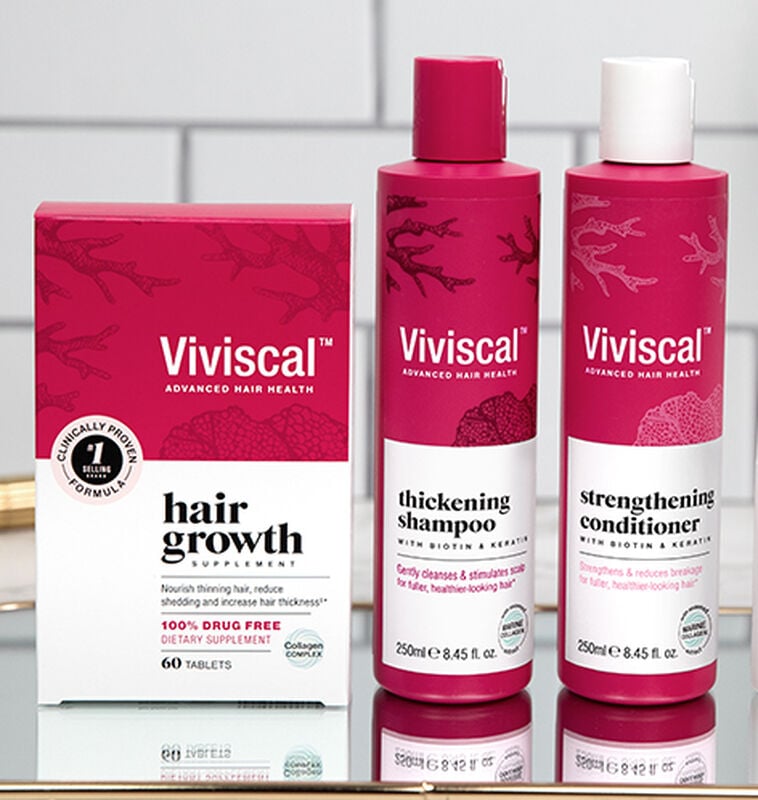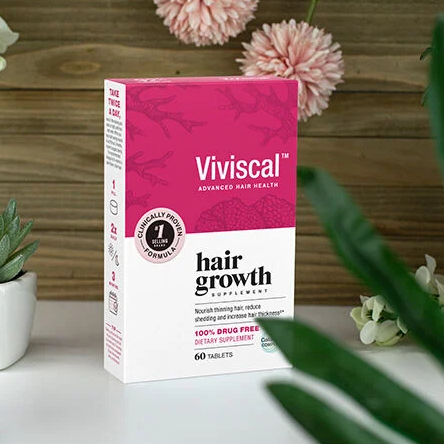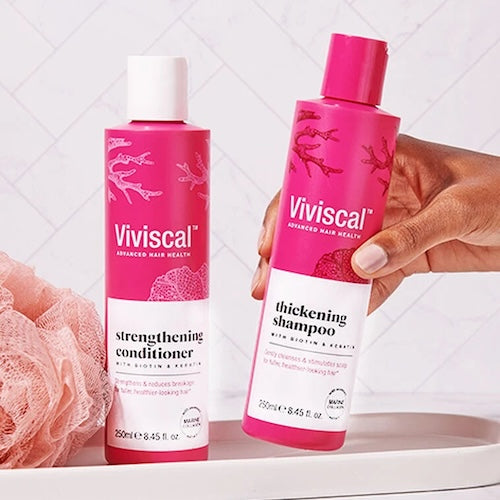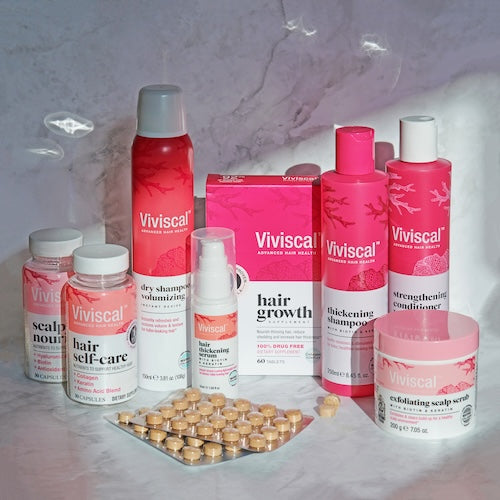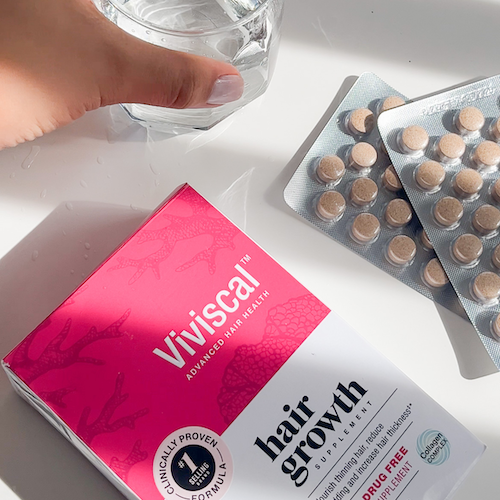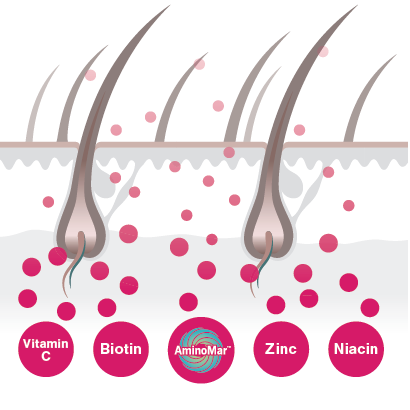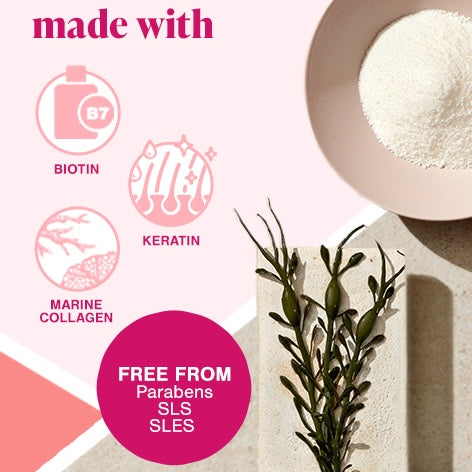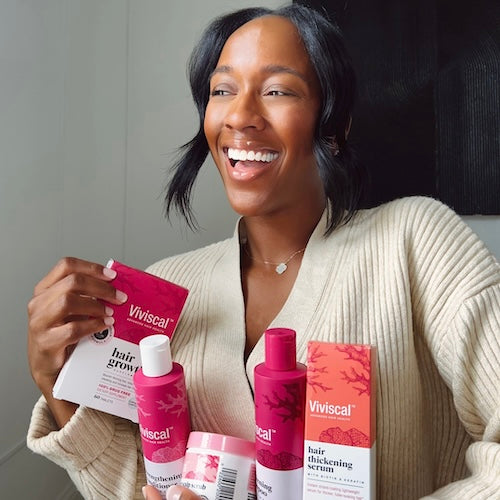Wonder what is coming down the pike as the years start ticking higher in number? Ever worry that your hair is making you look older than you feel?
Gray, thinning, dry and brittle hair are common complaints as we get older. Changes to our hair are a normal part of aging. Natural shifts in our hair follicles and scalp can impact the appearance and texture of our hair.
Never fear, while our hair can show some of the early signs of aging, Viviscal is here to help you and your hair look and feel your best.

What is aging hair?
As you age, there can be some common changes in your hair:
Most common signs of aging hair:
Hair Graying
Ever heard that if you pull out a gray hair, two gray hairs grow in its place? The good news is that it is a myth! But for those of us worried about aging, gray hair can be a sign that the process has started.
Hair starts going gray when special cells called melanocyte stem cells in the hair follicles stop producing melanin, the pigment that gives hair its color. For many, graying hair starts at the temples, and then extends towards the top of the head.
When you go gray is often determined by your genes. While some people begin going gray in their 20’s, for most people, the process commonly starts in their 30’s.
Hair Thinning
There are many factors that can make your hair look thinner as you age. One is that your hair follicles shrink over time, resulting in shorter and finer hair. Genetics, imbalanced diet, and stress are other factors that can also play a role in hair thinning.
As your hair follicles shrink, your hair will become finer. The diameter of the hairs in women usually increases until their 40’s, and then starts decreasing. Typically, men start seeing their hair become finer before women do. One reason why hair is thought to become finer is due to hormonal change.
As we age, it is common for both men and women to experience “thinning hair”. Male or female pattern baldness, also called androgenic alopecia, is one of many potential causes. For men, thinning begins at the hairline at the front of the head and at the back center of the crown of the head. For women, thinning usually starts with the center hair part getting wider on the top and crown of the scalp.
Stress, hormonal change, or even medication can also impact hair thinning. Telogen Effluvium, an often temporary type of hair loss caused by these factors, results in excessive shedding. The stress in your life may cause hair follicles to be pushed into a resting phase of the hair growth cycle, causing them to fall out from even simple actions such as washing or combing. Three to six months after the stress ends, hair will typically grow back.
Dry and Brittle Hair
There are also some common textural changes to aging hair. Aging hair loses moisture and becomes drier and more brittle, often taking on a frizzy look.
Can you stop the signs of aging hair as they are happening?
One of the guarantees of life is that we’ll age. But if you want, there are some things that you can do to better help manage certain issues of the aging process:
Can you stop graying hair?
In general, once graying happens, you can’t reverse it. You can of course use hair dye and colorants to cover up the gray. If your hair goes gray due to temporary conditions such as a stressful event, then depending on the removal timing of the stressor and the cycle of your hair at the time, some hair may regain its color.
Can you stop hair from thinning and excessive shedding?
You may slow down hair shedding, especially if you catch it early on in the process. Ways to decrease and decelerate hair shedding include improving your nutrition, taking a hair growth supplement, managing daily stress and protecting your hair from direct UV sunlight. You can also work with your health care provider to discuss options that might work for you.
Can thin hair become thick hair?
Unfortunately, when it comes to aging hair, you cannot transform hair strands that have become thinner into hair strands that are thicker. However, you can make your hair look thicker by using some tools to help. One such tool is Viviscal Hair Growth Supplements, which nourishes thinning hair and increases hair thickness.º* Viviscal Hair Thickening Serum is another tool, which promotes thicker, fuller-looking hair.^^ It works by instantly coating each strand for lightweight multidimensional density. ^^ You can also use hair building fibers like Toppik to help your hair look thicker.
Can you stop dry and brittle hair?
By giving your hair the moisture that it needs, you can help to reduce its dryness. There are several ways to accomplish this, such as by staying hydrated and ensuring regular use of a conditioner after you wash your hair. Another helpful practice is, after you finish your shower, you can gently brush or comb your favorite natural oils through your hair. It’s important to do this before you dry your hair.
Our top tips for hair care for aging hair:

In general, there’s a lot you can do to help support your hair looking its best as you age:
Take care of your scalp
- Taking care of your scalp helps support your hair growth. Exfoliation, for example, helps clean your pores and maintain a healthy scalp environment.
- Protecting your scalp from the sun’s rays. Wearing a hat is a simple yet effective way to prevent unnecessary damage to your hair.
Nourish your aging hair from the inside
- Healthy diet – enjoying a diet full of healthy foods can help provide the nutrients that you and your hair need to thrive.
- When thinking about a healthy diet, it can be helpful to focus on foods like fruits, vegetables, whole grains, nuts, seeds and legumes, which are wonderful sources of many essential nutrients.
- You’ll also want to consume enough protein, so choosing lean meats, eggs, chicken, fish, beans and tofu can all help you meet your daily needs.
- Viviscal Hair Growth Supplement – This hair growth supplement is a clinically proven solution for people suffering from fine or thinning hair to help them achieve thicker and fuller hair in as little as three months.*
Be gentle with your hair as it ages
A key way to support your hair as you age is to be thoughtful and gentle with your hair.
Do:
- Use shampoo and lightweight conditioner that won’t weigh your hair down. Viviscal Thickening Shampoo gently cleanses the hair and scalp, leaving your hair looking healthy, fuller, and thicker.± Viviscal Strengthening Conditioner is a lightweight conditioner that strengthens and reduces breakage for healthy-looking hair.^ Both have our floral fresh signature fragrance, which is infused with lush greens, dewy florals, and hints of ocean breeze. Both formulas are also paraben-free, SLS-free, and SLES-free.
- Sleep with a silk or satin pillowcase. As aging hair can be more fragile, it can be helpful to use these types of pillowcases to retain moisture and reduce breakage.
Don’t:
- Overuse hair styling tools, many of which put a lot of heat and strain on the hair.
- Choose hair styles that pull tightly on the hair, like tight ponytails, buns, tight up-dos, cornrows, and hair extensions or weaves, among others. If these types of hair styles are important to you, try looser versions or change it up at times to give the hairs a chance to rest.
- Brush your hair aggressively when it’s dry, as this can damage your hair.
If you have concerns about your hair, speak with your health care professional.
Changes in your hair are part of the normal aging process, but there are things you can do to help minimize the impact of aging on your hair. Viviscal is here to help. As hair experts, we at Viviscal offer several products to help support healthy hair, no matter your age.
Brought to you by the ViviscalTM hair experts.
±Use in conjunction with Viviscal Strengthening Conditioner
^Use in conjunction with Viviscal Thickening Shampoo
^^ Use in conjunction with Viviscal Thickening Shampoo and Viviscal Strengthening Conditioner
ºAblon, G.; Dermatol Res Pract., 2015
*These statements have not been evaluated by the Food and Drug Administration. This product is not intended to diagnose, treat, cure or prevent any disease.
